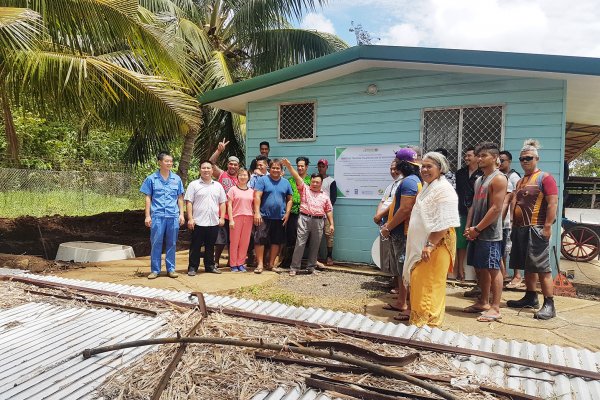COOPERATION
Biogas Digesters Training for Livestock Farmers

SAMOA FARMERS ASSOCIATION TRAINING: Livestock farmers with S.F.A. Project co-ordinator, Sala Tuiafiso Sagato, Dr Jim Liu (C.S.A.T.A.P.) Dr Yan Long and representatives from B.I.O.M.A.
Twenty farmers were taken through a hands-on Training organised by the Samoa Farmers Association (S.F.A.) on Fiber reinforced plastic Biogas Digesters this week at the China Samoa Agricultural Technical Aid Project (C.S.A.T.A.P.) training farm.
Implemented by S.F.A. and Biogas Institute of Ministry of Agriculture (B.I.O.M.A.) and funded by the U.N.D.P, the three-day training ended with a demonstration of installation at C.S.A.T.A.P. and after ten days, the digesters are expected to be installed house by house.
Livestock farmers and vegetable growers were prioritised for the project because manure is vital to producing the biogas.
Senior Engineer for B.I.O.M.A, Yan Long, said the biogas technology is very important for climate change because it could reduce the emissions in three respects.
For a start, storing and collecting methane from manure with the bio digester means less methane will be emitted into the atmosphere, “Second, biogas is a clean energy, and the energy in each cubic meter of biogas equals to 0.714kg standard coal equivalent, so the massive use of biogas can reduce peoples dependence on fossil energy including coal, firewood and LPG, and switch the habit of energy consumption into more cost-saving and energy-efficient means,” he said.
The production of a chemical fertilizer by the bio gas digester is also a plus and will alleviate the dependence on expensive chemical fertilisers by farmers.
“Alleviation of dependence on chemical fertilizer is an effective method to maintain and thicken the ozonosphere which has been damaged. As organic fertilizer, bio-slurry is a good replacement of chemical fertilizer, it can provide us a harvest without damaging the ozonosphere.”
The bio-digester is made up of fiber reinforced plastic said Long and has minimal to no failure rate with a life span expectancy of 30 years. She added that the aim of the project is to see the recipients and the technicians of ths project become advocators of biogas in their community, across the country and around the Pacific region.
The S.F.A. has an on-going U.N.D.P.-G.E.F. programme on biogas and the project aims to demonstrate sustainable agriculture practices through critical landscape management, to make the livestock industry profitable, sustainable and environmental friendly by promoting packets of technology to manage animal waste to be a benign product (resource) by value-adding and to cope with the crises of climate change. One of the strategies is to institutionalize the biogas technology in the local households by emplacing local people to be pioneers as trainers of future trainees of the country.
Source: Samoa Observer
By Elizabeth Ah-Hi

